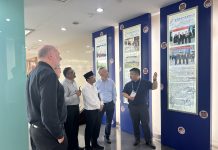Scholars from China and overseas gathered online for a cross-cultural dialogue on the Pentateuch discussing topics like the understanding of the Creation story from a liturgical theological perspective, the problem of evil in the Pentateuch, the concept of blessings in the first five books of the Bible, amongst other topics.

BEIJING, China – The Institute of Religious Studies of Minzu University of China (中央民族大学) held its annual Cross-Cultural Dialogue on 15 October 2021, with the support of co-organizer, the United Bible Societies (UBS).
Organized online this year due to the COVID-19 pandemic travel restrictions, the symposium invited research papers on translation, social and historical findings, comparative studies, theological interpretations, as well as cross-cultural readings of the Pentateuch to be presented.
A total of eight papers were presented and each presentation was followed by a time of dialogue and discussion. Presenters included scholars from Minzu University of China, Sun Yat-sen University, Shandong University, Singapore’s Trinity Theological College and the UBS. Post-graduate students of the Institute of Religious Studies of Minzu University and staff of UBS China Partnership were also in attendance.

Professor You Bin, Director of Institute of Religious Studies of Minzu University, said in his opening speech that the cultural significance of Biblical Studies in China is seen in the fact that it is a cross-cultural dialogue between the Mesopotamian and the Yellow and Yangtze River civilizations. Although relatively fewer scholars are involved in this research, quality papers have been produced. The Institute looks forward to more opportunities to foster the fellowship in Biblical Studies with scholars and researchers from UBS on the books of the Bible following the Pentateuch, like the Wisdom Literature, Prophets, Pauline Epistles, etc.
Mr Kua Wee Seng, Director of UBS China Partnership, appreciated Minzu University for inviting UBS to participate in the annual dialogue and recalled with thankfulness the past two dialogues held in 2018 and 2019. He said that “although we are from different nationalities and culture, we have a common interest in the Bible, and specifically a common research interest in the Bible”. He noted that this cross-cultural Dialogue on the Pentateuch is “part of the wider dialogue of civilizations which the Chinese leadership has urged the world to engage in, and hoped the dialogue will contribute to mutual understanding and greater appreciation of each other.”
Indeed, the dialogue between the two ancient civilizations were seen in Prof You Bin’s paper on liturgical theology, specifically how worship amongst Chinese Christians can be renewed by studying the Creation Story in Genesis 1-2 as foundational text, and looking at the Chinese culture of ritual and the Chinese character for it (禮). Interestingly, the etymology of the Chinese character has the meaning of God meeting a person who comes with a gift for Him. He posited that “liturgy is God’s people participating in God’s work.”
Is God then self-revealing or somewhat hidden? Why does He seem to sometimes act in non-rational or mysterious ways? These are the questions asked by Prof Cao Jian from Sun Yat-sen University in his exploration of the problem of evil in the Pentateuch. Citing the example of God calling Abram to sacrifice Isaac, amongst others, he suggested in his conclusion that “what one is conscious of is an intrinsic value in the incomprehensible – a value inexpressible, positive and significant. As it becomes felt in that consciousness, Elohim (God) is justified and one’s soul is brought to peace.”

This is the same God who generously blesses His creation and people as recorded in Genesis, which is the theme of UBS Global Translation Advisor, Dr Brigitte Rabarijona’s paper. Dr. Rabarijona (left) who is from the African island of Madagascar, shared that in the African context, blessings are given through the sprinkling or pouring of water, which symbolizes goodness from the heavens or God. She then explored the translation issues related to the word “bless”.
Another paper on translation issues was presented by Dr. habil. Lénart J. Regt, UBS Global Translation Advisor. If you have noticed repetition in the book of Exodus concerning the tabernacle and Moses’ encounter with God on Mount Sinai (Ex. 19-40), you would be enlightened by Dr Lénart who pointed out that these are to be treated as “parallel passages instead of in chronological sequence”. Such parallel passages form part of the “story telling in Exodus and affect the structure of the book”.
One of the presentations that generated some discussion was by Dr Chan Yew Ming, Old Testament Lecturer from Trinity Theological College, on the Ritualization of the Torah. He traced the process of how the five books of Moses became recognized as Holy Scripture, namely via semantic interpretation (reading, studying & interpretation), oral performance (public reading) and iconic veneration (holding a physical copy). Questions like whether similar research has been done for other books of the Bible were asked.
UBS Global Translation Advisor Dr Daniel See, who was also one of the eight presenters, represented UBS in giving the closing remark. He thanked Prof You Bin for inviting the United Bible Societies to be a part of the panel speakers for this exchange. With presenters hailing from different parts of the world like China, Malaysia, Madagascar, Netherlands and Singapore, he highlighted that the Dialogue has been enriched with Asian, African and European scholarship. He also looked forward to another dialogue, hopefully done face-to-face, on the Historical Books or the Prophets as a succession to the present one.
Story: Cynthia Oh
Edit: Elaine Ho
2021 © United Bible Societies China Partnership







